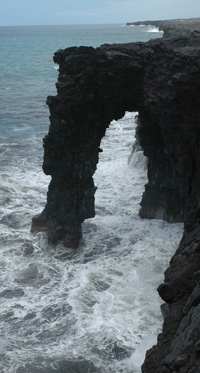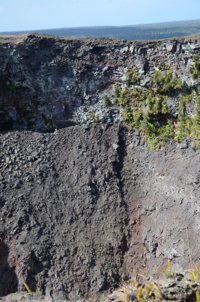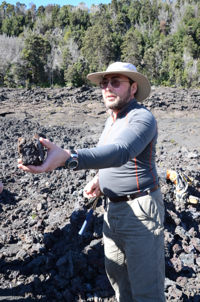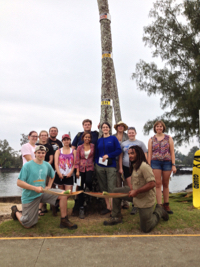Volcanism and Active Geology of the island of Hawai'i (Field-based course)
GEOS 252/352
Wintermester 2019
2 Credits
January 2019 dates: January 3-12, beginning in Hilo, Hawaii, ending in Kona

Instructors: Jeff Freymueller
jfreymueller -at- alaska.eduPavel Izbekov
peizbekov -at- alaska.eduElisabeth Nadin
enadin -at- alaska.eduLast Updated: October 29, 2018
A field-based course introducing students to the volcanism and active geology of the island of Hawai'i, and by extension, other oceanic islands. Topics include physical features of the volcanoes, plate tectonics and the origin of volcanism, and the development and "life cycle" of oceanic islands. In addition to tuition, the course has a fee ($1450), which includes food and lodging in the field along with local transportation, but does not include your airfare to Hawai'i. Students must register and pay for two credits of tuition along with any other applicable fees.

There is no substitute for field-based instruction in the geosciences. Students can learn a tremendous amount even from just a few days in the field, seeing features and processes with their own eyes, and this results not only in greater knowledge and insights but also enhanced enthusiasm and motivation. Our local climate handicaps us in our field-based offerings, but a winter field course in Hawai'i gets around that limitation. There is probably no better place in the world to introduce students to the basic physical features of volcanoes than the island of Hawai'i, with its active Kilauea and Mauna Loa volcanoes, and we can also make basic features of plate tectonics and a physical understanding of plate tectonics, erosion, the age and development of the ocean basins, and a host of other problems come to life vividly in this setting.
The volcanoes of the Big Island of Hawaii are one of the premier examples of active hotspot volcanism in the world, and are by far the most accessible. A wide variety of volcanic and geologic features are easily accessible, and do not require long drives to reach. A relatively short field trip can cover a wide range of topics, and will provide a memorable and highly educational experience for the students. Students will have a chance to tour the USGS Hawaiian Volcano Observatory, meet with scientists, see volcanic monitoring in action, and learn about the public safety aspects of that task. Cooperation with the USGS Hawaiian Volcano Observatory will allow students to see volcanic monitoring in action and learn about the public safety aspects of that task; depending on eruption conditions, this may also allow us to see some features in areas closed to the general public.

The course is offered at both the 200-level and the 300-level. Students at the 300-level will have additional responsibilities for peer instruction during projects and presentations. Students enrolled in GEOS 352 will be expected to read and discuss geological literature and tutor students enrolled in GEOS 252 in field and computer methods necessary for completion of team projects.
Prerequisites (252)
GEOS 101 or GEOS 120 or GE 261, or permission of instructor.
For non-UAF students, this translates to "you have taken a geology course."
Prerequisites (352)
GEOS 213 or GEOS 262; and GEOS 222 or GEOS 225 or any 300-level GEOS course, or permission of instructor
For non-UAF students, this translates to (1) an introductory geology course,
(2) Historical geology, (3) Mineralogy or a similar minerals and rocks course, and
(4) an upper division course, or field methods, or mapping/GIS.
If you are not a UAF student, you can find the course descriptions for these prerequisites at the UAF catalog. If you have questions about whether courses at another university will satsify the pre-requisites, then contact the instructors.
You must apply to the instructors if you want to take this course. Please contact us if you are interested and we will send you the application form!

Registration for this field course opens on November 12 for UAF degree-seeking students and November 26 for non-degree-seeking students (including non-UAF students). However, to be sure of a place please contact Dr. Freymueller about the short application process prior to registration opening. UAF students with instructor permission can register in their UAOnline account. Non-UAF students, once instructor permission has been granted, will be contacted by email with information on the registration process.
CRNs for the two 200-level and 300-level courses (Winter 2019) are:
- GEOS F252 CRN 36561 tuition and university fees: $527, course fee $1450, total $1987
- GEOS F352 CRN 36562 tuition and university fees: $629, course fee $1450, total $2079
There is a $250 non-refundable deposit due by December 1, and the remaining $1200 course fee must be paid by December 19.
Both are two credits. UAF charges in-state tuition for students enrolled in three or fewer credits in spring semester, of which WINTERmester is part. If this is the only UAF course you are taking, you are eligible for the in-state rates posted above. The total cost of the course is the $1450 course fee plus the tuition and miscellaneous university fees given above, plus your airline ticket to and from Hawaii.
There is a nonrefundable $250 deposit required. This charge will be entered on your student account when you register and must be paid by December 1 to secure your place in the class. The nonrefundable deposit is in place simply because of the disruption that would be caused by someone dropping out at the last minute -- extra housing and transportation costs, etc. would already have been incurred.
The nonrefundable deposit ($250), tuition, campus fees and the balance of the field trip fee ($1200) can be paid through UAOnline once your registration is complete. The total field trip fee of $1450 covers all course-related expenses within Hawaii. All costs for the course need to be paid in full by December 18, 2018 in order to participate in the course.
Once the short application is complete and instructor permission has been secured,
questions about the registration and/or payment process can be addressed to Summer
Sessions at 907-474-7021 or summer@alaska.edu.
UAF Summer Sessions & Lifelong Learning is the sponsor of the
WINTERmester session
when this class takes place.

Schedule for Winter 2019.
The course will begin in Hilo, Hawaii and end in Kona. Students will be expected to arrive in Hilo on Thursday January 3, and will be free to leave Kona on Saturday January 12 in the morning, or from Hilo that evening. We might be able to accommodate very late night departures from Kona (around midnight) on the 11th. We will need to know the arrival and departure times and flights for all students in advance.
Note that the schedule remains a bit unsettled due to the damage to infrastructure in the summit area. For example, as of October, the Thurston Lava Tube and Kilauea Iki trails remain closed. Some re-arrangement may be needed depending on what is open, and what areas are accessible to view.
Thu January 3 Students gather in Hilo, introduction
Fri January 4 2018 eruption flows, Tree molds
Sat January 5 Tsunami sites in Hilo, Pahoa, Lower East Rift Zone
Sun January 6 Overview of Kilauea caldera, Changes at the Summit, Mauna Ulu hike
Mon January 7 Thurston Lava Tube, Kilauea Iki, Lectures with HVO
Tue January 8 Collect monitoring data with HVO staff
Wed January 9 Ka'u Desert, travel to South Point and green sand beach, olivine,
Thu January 10 Xenoliths, Hualalai volcano (Kona side), Pololu Valley
Fri January 11 Pu'u Wa'awa'a, Waipio Valley
Sat January 12 Trip finishes in Kona. Students may fly home this morning, or in the afternoon/evening from Hilo

Online Reference Material
- The USGS Hawaiian Volcano Observatory website is a good starting portal for all kinds of information about volcanoes in Hawaii.
- Last year, the ongoing eruption sent lava nearly into the town of Pahoa. This year the lava lake in the crater inside Halemaumau at the summit of Kilauea overspilled for a while. You can find the latest information about the situation, including photos, at this link. A news article about the 2015 activity and the ground deformation associated with it is at Big Island Now.
- USGS Geological Map of the island of Hawaii. The booklet that goes with this map (free, online) has a lot of useful material at an ideal level for undergraduate students.
- USGS Professional Paper 1801, "Characteristics of Hawaiian Volcanoes". From the announcement of its's release: "The volume, which was produced in conjunction with the Centennial of the USGS Hawaiian Volcano Observatory (HVO) in 2012, reviews the history of research and the current understanding of Hawaiian volcanism across a wide spectrum of topics. The book also introduces new data and models to address such issues as flank instability, island evolution, eruption dynamics, hazards, and a variety of other subjects." As this volume is new, I have not yet checked carefully to see what level this is written at.
- Hawaii Magazine has a page that features a video on the 1960 Kapoho eruption made by Fred Rackle of the Center for the Study of Active Volcanoes at UH-Hilo. The University of Hawaii has a great collection of bathymetric maps of the Hawaiian chain.
I get paid to research volcanoes?
Dr. Matt Patrick from USGS Hawaii Volcano Observatory was profiled in a nice video by CNBC as part of their "I get paid to do this?" series.
Dr. Jeffrey T. Freymueller
Professor of Geophysics
Geophysical Institute
University of Alaska, Fairbanks
Fairbanks, AK 99775-7320














